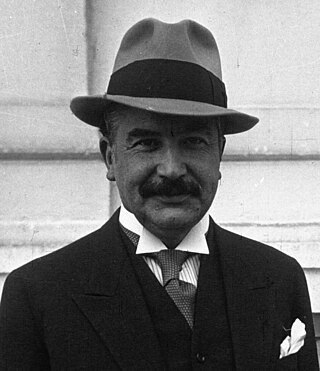
The Christian Social People's Party, is the largest political party in Luxembourg. The party follows a Christian-democratic and conservative ideology and has been described as centre to centre-right. Furthermore, akin to most parties in Luxembourg, it is strongly pro-European. The CSV is a member of the Christian Group, European People's Party, and the Centrist Democrat International.

The Luxembourg Socialist Workers' Party, abbreviated to LSAP or POSL, is a social-democratic, pro-European political party in Luxembourg. The LSAP sits on the centre-left of the political spectrum.

Joseph Bech was a Luxembourgish politician and lawyer. He was the 15th prime minister of Luxembourg, serving for eleven years, from 16 July 1926 to 5 November 1937. He returned to the position after World War II, and served for another four years as the 17th prime minister, from 29 December 1953 until 29 March 1958. The 1982–1983 academic year at the College of Europe was named in his honour.

Pierre Dupong was a Luxembourgish politician and statesman. He was the 16th prime minister of Luxembourg, serving for sixteen years, from 5 November 1937 until his death, on 23 December 1953, and was also responsible at different times for the ministries of finance, the army, agriculture, labour and social matters. He founded the Christian Social People's Party (CSV) as the main conservative party after the Second World War, having been a founding member of the Party of the Right (PD) in 1914.

Victor Nicolas Bodson was a socialist Luxembourgish politician and lawyer who held the posts of Minister of Justice, Public Works, and Transport for long periods of time in the 1940s and 1950s, including in exile during World War II, when Luxembourg was occupied by Nazi Germany.
The National Union Government was a form of national government that governed the Grand Duchy of Luxembourg between 1945 and 13 February 1947, in the direct aftermath of the Second World War. During the war, Luxembourg was invaded, occupied, and annexed by Nazi Germany. Just one of the Luxembourgish casualties of the conflict was the pre-war political system; most of the established parties and alliances disappeared, and some of the leading politicians had lost their lives.
Pierre Frieden was a Luxembourgish politician and writer. He was the 18th prime minister of Luxembourg, serving for eleven months, from 29 March 1958 until his death, on 23 February 1959. He also served as Interior Minister from 1951.
The Party of the Right, abbreviated to PD, was a political party in Luxembourg between 1914 and 1944. It was the direct predecessor of the Christian Social People's Party (CSV), which has ruled Luxembourg for all but fifteen years since.
Lambert Schaus was a Luxembourgish politician, jurist, and diplomat. He held office as a government minister and European Commissioner.

Eugène Schaus was a Luxembourgish politician and jurist. Schaus was a leading light in the early days of the Democratic Party, of which he would be President from 1952 until 1959.

The Werner-Cravatte Government was the government of Luxembourg between 15 July 1964 and 6 February 1969. Throughout its term, the Deputy Prime Minister was Henry Cravatte, replacing Eugène Schaus, who had been Deputy Prime Minister in the first Werner-Schaus Government. It was a coalition between the Christian Social People's Party (CSV), and the Luxembourg Socialist Workers' Party (LSAP).
The Frieden Government was the government of Luxembourg between 29 March 1958 and 23 February 1959 until the death of Pierre Frieden. It was a coalition between the Christian Social People's Party (CSV), and the Luxembourg Socialist Workers' Party (LSAP).

The Bech-Bodson Ministry was the government of Luxembourg between 29 December 1953 and 29 March 1958. It was a coalition between the Christian Social People's Party (CSV), and the Luxembourg Socialist Workers' Party (LSAP).

The Dupong-Bodson Ministry was the government of Luxembourg between 3 July 1951 and 23 December 1953. It was a coalition between the Christian Social People's Party (CSV), and the Luxembourg Socialist Workers' Party (LSAP). It was formed after the general election of 1951.
The Dupong-Schaus Ministry was the government of Luxembourg between 1 March 1947 and 3 July 1951. It was a coalition between the Christian Social People's Party (CSV), and the Democratic Group.

The Luxembourgish government in exile, also known as the Luxembourgish government in London, was the government in exile of Luxembourg during the Second World War. The government was based in London between 1940 and 1944, while Luxembourg was occupied by Nazi Germany. It was led by Pierre Dupong, and also included three other Ministers. The head of state, Grand Duchess Charlotte, also escaped from Luxembourg after the occupation. The government was bipartite, including two members from both the Party of the Right (PD) and the Socialist Workers' Party (LSAP).

The Dupong-Krier Ministry took office in Luxembourg on 5 November 1937 after the resignation of the prime minister Joseph Bech, due to the result of a referendum on the so-called Maulkuerfgesetz.

The Bech Ministry was the government of Luxembourg that came into office in Luxembourg on 16 July 1926 after the resignation of the Prüm Ministry, and was headed by Joseph Bech. It was reshuffled on 11 April 1932 and on 27 December 1936. It stepped down after the referendum on the so-called Maulkuerfgesetz, in which the majority of voters decided against the law.
Guillaume Konsbruck was a Luxembourgish military officer, politician, and manager of the steel company Arbed.







